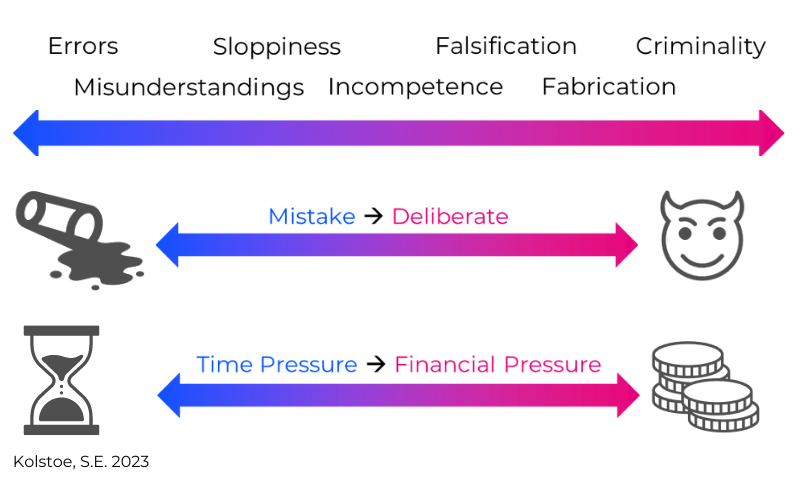Questionable Research Practices
Guidance from UKRIO
- Simon Kolstoe. Defining the Spectrum of Questionable Research
Practices (QRPs), UKRIO, 2023 https://doi.org/10.37672/UKRIO.2023.02.QRPs

The Spectrum of Questionable Research Practices, from https://doi.org/10.37672/UKRIO.2023.02.QRPs
References
- Andrade C. (2021). HARKing, Cherry-Picking, P-Hacking, Fishing Expeditions, and Data Dredging and Mining as Questionable Research Practices. The Journal of Clinical Psychiatry, 82(1), 20f13804. https://doi.org/10.4088/JCP.20f13804
- Banks, G. C., Rogelberg, S. G., Woznyj, H. M., Landis, R. S., & Rupp, D. E. (2016). Editorial: Evidence on Questionable Research Practices: The Good, the Bad, and the Ugly. Journal of Business and Psychology. https://doi.org/10.1007/s10869-016-9456-7
- Bierman, D. J., Spottiswoode, J. P., & Bijl, A. (2016). Testing for Questionable Research Practices in a Meta-Analysis: An Example from Experimental Parapsychology. PLOS ONE https://doi.org/10.1371/journal.pone.0153049
- Fraser, H., Parker, T., Nakagawa, S., Barnett, A., & Fidler, F. (2018). Questionable research practices in ecology and evolution. PLOS ONE. https://doi.org/10.1371/journal.pone.0200303
- Gerrits, R. G., Mulyanto, J., Wammes, J. D., van den Berg, M. J., Klazinga, N. S., & Kringos, D. S. (2020). Individual, institutional, and scientific environment factors associated with questionable research practices in the reporting of messages and conclusions in scientific health services research publications. BMC Health Services Research, 20(1), 828. https://doi.org/10.1186/s12913-020-05624-5
- Hooper, M., Barbour, V., Walsh, A., Bradbury, S., & Jacobs, J. (2018). Designing integrated research integrity training: authorship, publication, and peer review. Research Integrity and Peer Review, 3(1), 2. https://doi.org/10.1186/s41073-018-0046-2
- Kaiser, M., Drivdal, L., Hjellbrekke, J., Ingierd, H., & Rekdal, O. B. (2021). Questionable Research Practices and Misconduct Among Norwegian Researchers. Science and Engineering Ethics, 28(1), 2. https://doi.org/10.1007/s11948-021-00351-4
- Rajah-Kanagasabai, C. J., & Roberts, L. D. (2015). Predicting self-reported research misconduct and questionable research practices in university students using an augmented theory of planned behavior. Frontiers in Psychology. https://doi.org/10.3389/fpsyg.2015.00535
- Schneider, J.W., Allum, N., Andersen, J.P., Petersen, M.B., Madsen, E.B., et al. (2024). Is something rotten in the state of Denmark? Cross-national evidence for widespread involvement but not systematic use of questionable research practices across all fields of research. PLOS ONE 19(8): e0304342. https://doi.org/10.1371/journal.pone.0304342
Video
- Examples of questionable research practices, presented by Annemarie Zand Scholten, Assistant Professor, Economics and Business from the University of Amsterdam https://es.coursera.org/lecture/quantitative-methods/6-06-questionable-research-practices-zdcxz (5 mins)
- Nick Fox from the Department of Psychology at Rutgers University discusses how many researchers use questionable research practices and the impact of this behaviour. https://www.youtube.com/watch?v=bVcb62B58EQ
Infographic
- Questionable research practices that may lead to research misconduct, ORI https://ori.hhs.gov/sites/default/files/2018-12/Slippery%20Slope%20RM%20Rasterized.pdf
Slides
- Neuroskeptic (2015): The Resistible Rise of Questionable Research Practices. figshare. Presentation. https://doi.org/10.6084/m9.figshare.1540908.v2
Last revised September 2024.
Please note that this list of resources is not intended to be exhaustive and should not be seen as a substitute for advice from suitably qualified persons. UKRIO is not responsible for the content of external websites linked to from this page. If you would like to seek advice from UKRIO, information on our role and remit and on how to contact us is available here.
UKRIO would like to thank our Advisory Board and other volunteers for their help in putting this list together.
